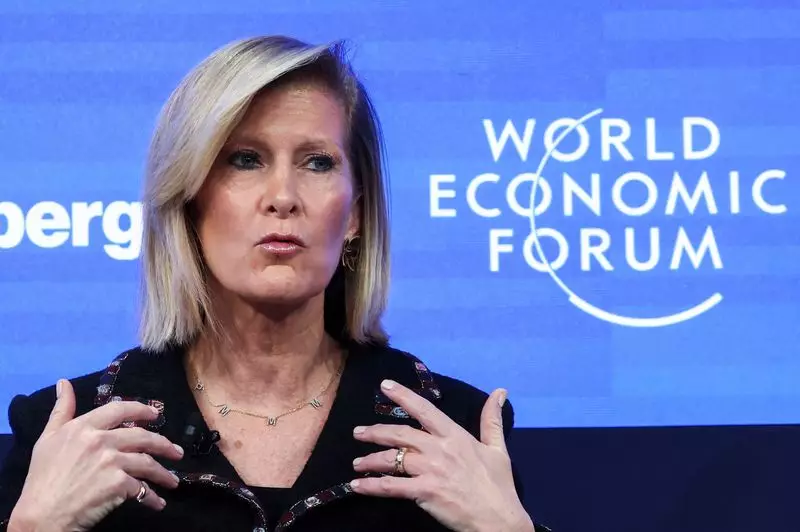The world of finance is always in flux, and the recent developments following U.S. President Donald Trump’s inauguration for a second term have thrust the global financial community into a state of heightened alert. Notably, JPMorgan Chase & Co.’s proactive stance in assembling a dedicated team to analyze the implications of Trump’s executive orders highlights the urgency and complexity underpinning this transitional period in governance.
The response from banks and financial institutions has showcased a blend of anxiety and anticipation. In a striking display of readiness, JPMorgan’s head of asset and wealth management, Mary Callahan Erdoes, indicated that the firm had established a “war room” focused on dissecting the ramifications of nearly 80 revoked executive actions from former President Joe Biden’s administration. These swift cuts—including impositions on federal regulations and hiring practices—suggest a momentous shift in policy direction.
Erdoes’ remarks at the World Economic Forum in Davos, Switzerland, underscore the unease palpable within the financial markets. The sentiment is underscored by turbulent market conditions, particularly the fluctuating value of currencies sensitive to Trump’s protectionist measures. As JPMorgan’s analysts and traders navigated the uncertain waters of a revived “America First” agenda, the immediate impact on currencies like the Canadian dollar spoke volumes, illustrating how swiftly policy changes can ripple through markets.
The reverberations of Trump’s policy shifts extend beyond domestic matters, affecting international trade relationships and dynamics. Economic leaders such as Standard Chartered CEO Bill Winters have articulated concerns over the potential resurgence of tariffs—especially concerning China, a major player in global export markets. The anxiety over revived trade tensions could starkly alter the landscape of international commerce, an area that had begun to stabilize post-Biden’s administration.
Winters emphasized the inevitable “interesting ructions” that would accompany the new administration’s settling-in phase. However, while big banks might stand to gain from the brokerage roles they play amid these disruptions, localized banks could find themselves facing formidable challenges. The consequences of these tariff discussions resonate not only in the realm of finance but also in manufacturing and supply chain logistics, where fluctuations can lead to significant downstream effects.
Alongside the uncertainties of trade and currency fluctuations lies the challenge of navigating the complex regulatory landscape. Bank executives at the Davos meeting conveyed frustrations with the stifling nature of current regulations, echoing sentiments that additional constraints could hinder aspirations for global growth. The emphasis on regulation’s negative impact on growth goals signals a broader discourse within financial circles questioning the effectiveness and intent of existing laws.
The Bank of England’s decision to postpone tougher bank capital rules reflects a cautious approach as global financial norms adapt to the shifting political climate in the United States. These revisions, mandated by international committees, are designed to bolster financial stability; however, their implementation has encountered delays that warrant scrutiny regarding their ultimate efficacy. According to both Winters and BNY CEO Robin Vince, it is crucial to evaluate which regulations genuinely support growth and which could impede progress.
With Europe and other regions looking to respond to changes emanating from U.S. policies, there is a noticeable push among European leaders to reassess their own regulatory frameworks. Santander’s executive chair, Ana Botin, highlighted the need for European nations to recalibrate their approach, suggesting a temporary halt on new regulatory measures. This imperative for international cooperation may become increasingly vital as countries strive to remain competitive in the evolving global market.
The convergence of contrasting political ideologies and regulatory environments could lead to an era marked by both innovation and friction across borders. The outcomes of potential trade agreements and the management of capital flows will rely heavily on how countries can align their interests without sacrificing national priorities.
The prevailing narrative among financial leaders at the World Economic Forum embodies a blend of cautious optimism and strategic recalibration. As markets brace for potential turbulence, the overarching takeaway is the imperative for adaptability. Financial institutions will need to leverage their insights and agility to navigate the complexities of a rapidly evolving landscape. Success will hinge on their ability to preemptively respond to changes while capitalizing on the opportunities that arise amidst disruption.
The intricate interplay of Trump’s reinstated policies, regulatory shifts, and the international response showcases a multifaceted financial environment. As global markets brace for inevitable change, the call to action for stakeholders across the board is clear: adaptability, vigilance, and collaboration will be paramount in steering through the turbulent waters of the coming era.

